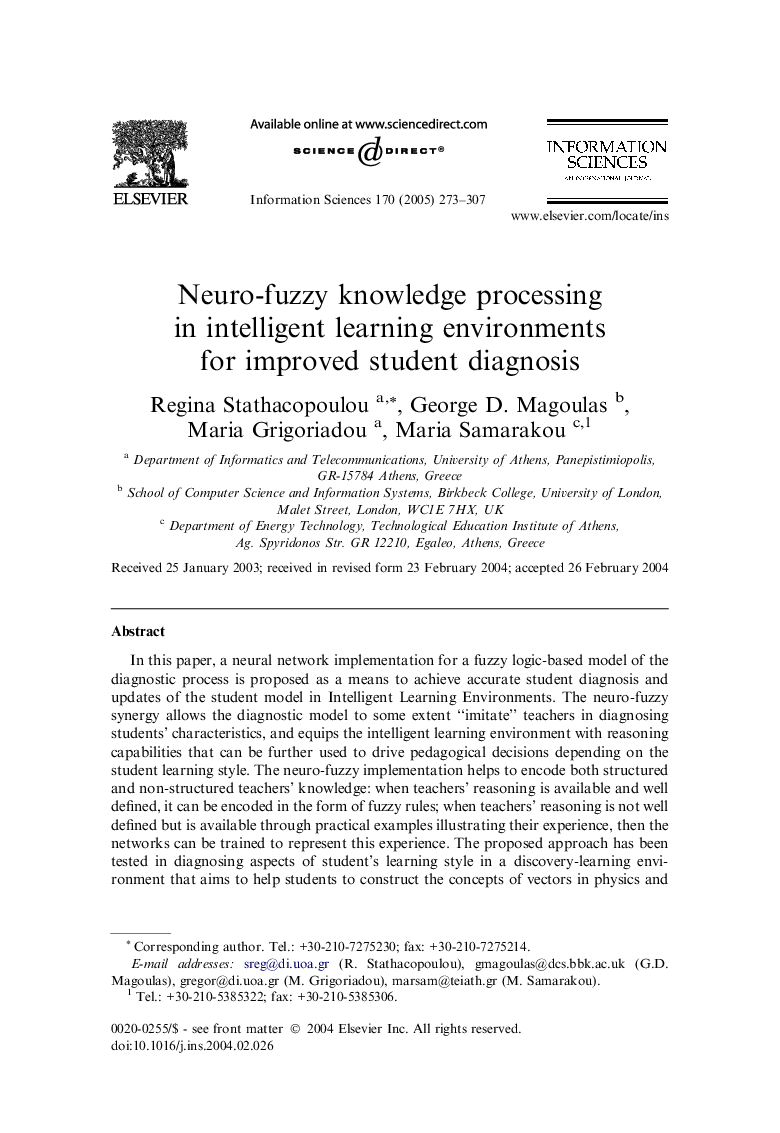| کد مقاله | کد نشریه | سال انتشار | مقاله انگلیسی | نسخه تمام متن |
|---|---|---|---|---|
| 9651055 | 666434 | 2005 | 35 صفحه PDF | دانلود رایگان |
عنوان انگلیسی مقاله ISI
Neuro-fuzzy knowledge processing in intelligent learning environments for improved student diagnosis
دانلود مقاله + سفارش ترجمه
دانلود مقاله ISI انگلیسی
رایگان برای ایرانیان
کلمات کلیدی
موضوعات مرتبط
مهندسی و علوم پایه
مهندسی کامپیوتر
هوش مصنوعی
پیش نمایش صفحه اول مقاله

چکیده انگلیسی
In this paper, a neural network implementation for a fuzzy logic-based model of the diagnostic process is proposed as a means to achieve accurate student diagnosis and updates of the student model in Intelligent Learning Environments. The neuro-fuzzy synergy allows the diagnostic model to some extent “imitate” teachers in diagnosing students' characteristics, and equips the intelligent learning environment with reasoning capabilities that can be further used to drive pedagogical decisions depending on the student learning style. The neuro-fuzzy implementation helps to encode both structured and non-structured teachers' knowledge: when teachers' reasoning is available and well defined, it can be encoded in the form of fuzzy rules; when teachers' reasoning is not well defined but is available through practical examples illustrating their experience, then the networks can be trained to represent this experience. The proposed approach has been tested in diagnosing aspects of student's learning style in a discovery-learning environment that aims to help students to construct the concepts of vectors in physics and mathematics. The diagnosis outcomes of the model have been compared against the recommendations of a group of five experienced teachers, and the results produced by two alternative soft computing methods. The results of our pilot study show that the neuro-fuzzy model successfully manages the inherent uncertainty of the diagnostic process; especially for marginal cases, i.e. where it is very difficult, even for human tutors, to diagnose and accurately evaluate students by directly synthesizing subjective and, some times, conflicting judgments.
ناشر
Database: Elsevier - ScienceDirect (ساینس دایرکت)
Journal: Information Sciences - Volume 170, Issues 2â4, 25 February 2005, Pages 273-307
Journal: Information Sciences - Volume 170, Issues 2â4, 25 February 2005, Pages 273-307
نویسندگان
Regina Stathacopoulou, George D. Magoulas, Maria Grigoriadou, Maria Samarakou,